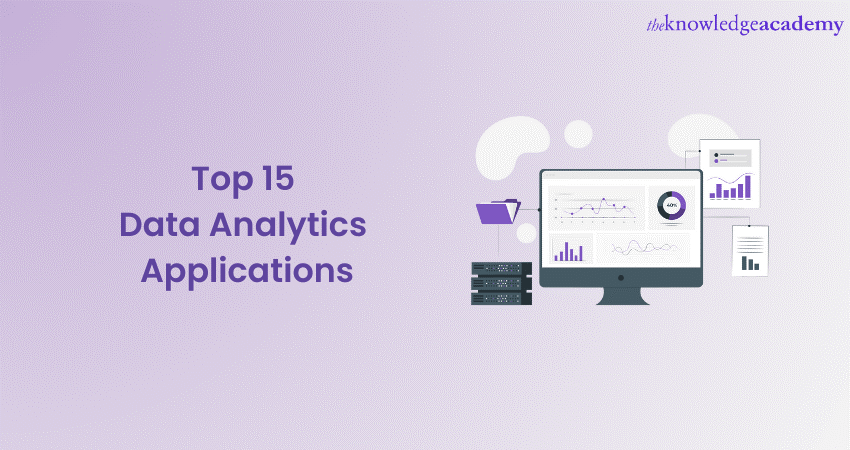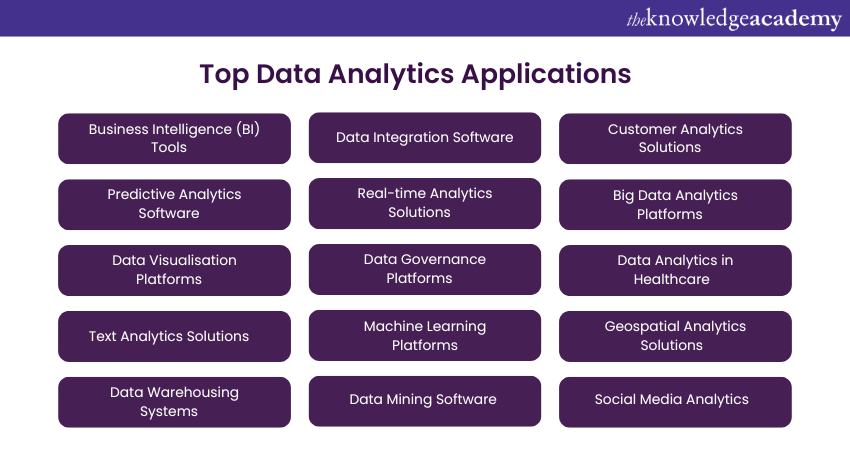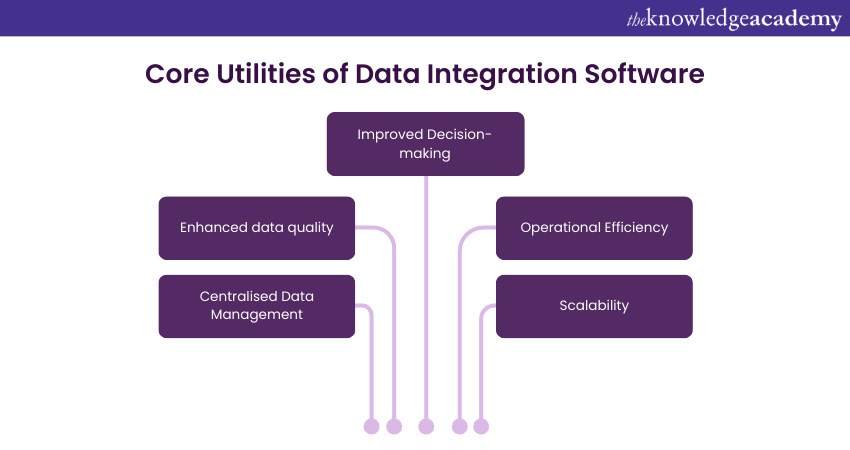We may not have the course you’re looking for. If you enquire or give us a call on +971 8000311193 and speak to our training experts, we may still be able to help with your training requirements.
Training Outcomes Within Your Budget!
We ensure quality, budget-alignment, and timely delivery by our expert instructors.

Imagine you’re Sherlock Holmes, but instead of a magnifying glass, you’ve got a spreadsheet. Data Analytics Applications are like Watson, whispering secrets to you from the numbers. From predicting which Netflix show you’ll binge-watch next (hello, recommendation algorithms!) to helping doctors diagnose diseases faster (AI-powered medical imaging, anyone?), these applications are the unsung heroes of our digital age.
Additionally, Statista states that the worldwide market size of Business Intelligence (BI) and Analytics Software applications is expected to go from £12 billion in 2021 to over £14 billion in 2026. Given this circumstance, this blog aims to help you explore the transformative capabilities of Data Analytics Applications and how they can propel your organisation to new heights.
Table of Contents
1) What are Data Analytics Applications?
2) Top Data Analytics Applications
a) Business Intelligence (BI) Tools
b) Predictive Analytics Software
c) Data Visualisation Platforms
d) Text Analytics Solutions
e) Data Warehousing Systems
f) Data Integration Software
g) Real-time Analytics Solutions
h) Data Governance Platforms
i) Machine Learning Platforms
j) Data Mining Software
3) Conclusion
What are Data Analytics Applications?
Data Analytics leverages powerful tools to extract valuable insights from vast data sets, using specialised software and techniques for processing, analysis, and visualisation. These applications include Business Intelligence (BI) tools, predictive analytics software, data visualisation platforms, text analytics solutions, and more, all of which are designed to support informed decision-making.
By understanding customer behaviour, optimising operations, identifying market trends, and predicting future outcomes, businesses can make data-driven decisions. This not only provides a competitive edge but also unlocks new opportunities for growth and success in today’s data-centric world.
Top Data Analytics Applications
Now that we know what Data Analytics Applications are, we will now delve into understanding the different applications of Data Analytics. Let’s explore some of the top applications of Data Analytics that have sparked a revolution in the way businesses analyse their data:

1) Business Intelligence (BI) Tools
Business Intelligence (BI) tools have completely transformed the way businesses gather and analyse data, enabling them to make data-driven decisions confidently. These Data Analytics Applications serve as a centralised platform for data integration, analysis, and reporting. As a result, they empower users with valuable insights.
BI tools offer a user-friendly interface that allows even non-technical users to explore data effortlessly. Through interactive dashboards and visually appealing charts, data can be presented in a meaningful and easy-to-understand manner. Executives and decision-makers can monitor Key Performance Indicators (KPIs), track business trends, and identify areas for improvement.
Moreover, the power of BI lies in its ability to consolidate data from multiple sources, such as databases, spreadsheets, and cloud services. This comprehensive view of data enhances data accuracy and eliminates information silos. As a result, it promotes collaboration across departments.
2) Predictive Analytics Software
Data Analytics Applications also include predictive analytics software. It has revolutionised the way businesses anticipate future trends and make proactive decisions. It utilises historical data and advanced statistical algorithms to forecast future outcomes and identify potential opportunities and risks.
Further, predictive analytics tools help organisations identify patterns, detect anomalies, and recognise trends from vast datasets. As a result, these organisations can optimise processes and improve efficiency. By understanding customer behaviour with these applications, companies can deliver personalised experiences, increasing customer satisfaction and loyalty.
In marketing, predictive analytics aids in identifying the most promising leads and tailoring marketing campaigns to target specific customer segments. Additionally, predictive maintenance in manufacturing helps reduce downtime and increase equipment reliability by anticipating potential failures.
Gain hands-on experience and expert insights with our Big Data and Analytics Training – register now and reach new heights.
3) Data Visualisation Platforms
Data visualisation platforms are pivotal in transforming raw data into insightful visual representations. These Data Analytics Applications offer an array of charts, graphs, and infographics, making complex data easily understandable and accessible to stakeholders.
Visualisations are essential to data storytelling, as they help communicate key findings, trends, and patterns. By visually presenting the data, data visualisation applications enable decision-makers to grasp insights at a glance and make informed choices promptly.
4) Text Analytics Solutions
Text analytics solutions have become invaluable in deciphering the huge amount of unstructured text data generated daily. Be it social media posts, emails and online reviews, these Data Analytics Applications utilise Natural Language Processing (NLP) algorithms to extract valuable insights from text.
Within text analytics, sentiment analysis is one of the most common applications. By assessing the emotional tone of customer reviews and social media posts, businesses can gauge public sentiment towards their products or services. This information helps the Data Analytics Applications identify areas for improvement and enhance customer satisfaction.
Register for our Big Data Analysis Course and discover how to turn complex data into valuable business insights.
5) Data Warehousing Systems
Data warehousing systems act as the backbone of Data Analytics, providing a robust and scalable infrastructure to store and manage large amounts of data. These systems centralise data from multiple sources, making it easier for businesses to analyse and access information.
Data warehousing enables the integration of data from various departments and systems within an organisation. As a result, users can perform complex queries and generate reports that span across different aspects of the business. They can foster a comprehensive analysis.
By storing historical data, data warehousing systems support trend analysis and enable businesses to make data-driven predictions about future outcomes. This long-term data storage also ensures compliance with regulatory requirements for data retention.
Data warehousing is particularly useful for Business Intelligence applications. Its ability to consolidate and organise data in a single repository empowers users to create interactive dashboards. It also helps them generate real-time reports that support decision-making at all levels of the organisation.
6) Data Integration Software
Data integration software serve as the bridge that connect various data sources and harmonise data across the organisation. These Data Analytics Applications automate the process of Extracting, Transforming, and Loading (ETL) data. This ensures that information is accurate, consistent, and up-to-date.

With data integration software, businesses can overcome data silos that often hinder the accessibility and usability of data. By creating a unified view of data with these applications, companies can avoid duplication and reduce errors. They can also streamline data management processes.
Additionally, data integration enhances data quality by identifying and resolving data inconsistencies and errors that may arise from different data sources. By ensuring data accuracy, businesses can trust the information they use for decision-making and strategic planning.
7) Real-time Analytics Solutions
Real-time analytics has become a game-changer for businesses operating in dynamic and fast-paced environments. Data Analytics Applications based on real-time analytics process data as it is generated, providing immediate insights that allow organisations to respond swiftly to changing circumstances.
It is essential for industries like finance, e-commerce, and the Internet of Things (IoT). In finance, it helps monitor stock market trends and identify potential investment opportunities. In e-commerce, businesses can optimise their websites and marketing campaigns based on real-time customer behaviour.
Additionally, real-time analytics facilitates proactive risk management by detecting anomalies and potential issues as they happen. For example, in the manufacturing sector, it helps identify operational inefficiencies and equipment malfunctions, leading to improved productivity and reduced downtime.
Want to take your Data Science skills to the next level? Join our Big Data Analytics & Data Science Integration Course now!
8) Data Governance Platforms
Data governance platforms play a critical role in ensuring the security, integrity, and compliance of data within an organisation. These Data Analytics Applications establish data management policies, procedures, and standards. As a result, they create a framework that governs data usage and access.
Data governance promotes data quality by defining data standards and enforcing data validation rules. By adhering to these standards, businesses can trust the accuracy and consistency of their data, making it reliable for decision-making and reporting.
9) Machine Learning Platforms
Machine Learning platforms that are currently on the market have brought advanced analytics to the masses. They enable organisations to integrate the significance of the AI system into practice without the need to code proficiently. Due to the fact that AI applications have pre-described built-in Machine Learning algorithms and automation, it shows that Machine Learning technology is available for mass users.
In addition, there are many fields in which Machine Learning is applied ranging from retail business, to healthcare, and even financial institutions. In retail it is used for recommendation engines, marketing automation, demand forecasting and many more applications where it enhances the customer experience and also driving the sales.
Machine Learning platforms further enable businesses to extract useful patterns and knowledge from huge volumes of data. Such knowledge can result in improvements in the existing processes, minimisation of costs, and even the creation of new outputs, which are key components in an organisation’s competitive advantage framework.
10) Data Mining Software
Data mining software is instrumental in uncovering valuable insights and patterns from large datasets. These aid in informed decision-making and strategic planning. These Data Analytics Applications use statistical and Machine Learning algorithms to explore data and identify relationships among variables.
Data mining supports businesses in understanding customer behaviour, market trends, and factors influencing business performance. For example, retail companies can use Data mining to segment their customers according to their buying habits and preferences, enabling targeted marketing campaigns.
11) Customer Analytics Solutions
Customer analytics solutions focus on understanding customer behaviour and preferences to enhance marketing strategies and drive customer loyalty. By analysing customer data from various touchpoints, businesses can gain valuable insights that inform personalised marketing initiatives.
With customer analytics, companies can build detailed customer profiles and segment their audience as per preferences, demographics, and purchasing patterns. This segmentation enables targeted marketing campaigns that resonate with specific customer groups.
Unlock your data prowess with our Advanced Data Analytics Certification Training - join today!
12) Big Data Analytics platforms
Big Data Analytics platforms offer scalable and distributed processing capabilities, allowing businesses to handle massive datasets efficiently. These Data Analytics Applications utilise parallel processing to analyse data in real time. As a result, these platforms help unlock valuable insights that traditional Data Analytics methods may overlook.
In industries like finance and e-commerce, Big Data Analytics enables real-time fraud detection, risk assessment, and anomaly detection. By analysing vast amounts of data quickly using these applications, businesses can respond promptly to potential threats and opportunities.
Big Data Analytics is also vital in marketing and customer relationship management. By analysing customer behaviour and interactions across various channels, businesses can gain an extensive understanding of customer preferences and sentiments. This understanding can help them drive personalised marketing campaigns and product recommendations.
13) Data Analytics in Healthcare
Data Analytics has significantly transformed the healthcare industry. It is crucial in improving patient care, optimising operations, and driving medical research. Electronic Health Records (EHRs) and medical devices generate massive amounts of data, which can be analysed to gain valuable insights.
Data Analytics also facilitates disease prediction and diagnosis by analysing patient data and identifying risk factors associated with specific conditions. This early detection enables timely interventions and enhances patient outcomes. In addition, Data Analytics supports the optimisation of hospital operations and resource allocation.
14) Geospatial Analytics Solutions
Geospatial analytics is a powerful Data Analytics application that leverages Geographic Information System (GIS) Technology to analyse and visualise spatial data. This Data Analytics application enables businesses to understand patterns and relationships based on location, leading to valuable insights for various industries.
In urban planning and city management, geospatial analytics helps optimise infrastructure development, traffic flow, and resource allocation. By overlaying data on maps, city planners can identify areas of high demand and plan for more efficient and sustainable urban environments.
15) Social Media Analytics
Social media analytics is a specialised Data Analytics application that focuses on extracting insights from social media platforms. With billions of users generating vast amounts of data daily, this analytics provides information for businesses to understand customer sentiment, trends, and preferences.
This application employs text mining, sentiment analysis, and social network analysis to monitor and interpret social media interactions. Brands can gauge public sentiment towards their products and services. They can also measure the impact of marketing campaigns and respond to customer feedback promptly.
Social media analytics also aids in competitor analysis and market research. By tracking competitor mentions and analysing social media trends, businesses can identify opportunities and stay ahead of their competition.
Conclusion
Data Analytics Applications have become indispensable tools for organisations seeking a competitive edge through data-driven decision-making. From Business Intelligence and predictive analytics to Big Data processing and customer insights, these applications of Data Analytics have opened endless new possibilities for innovation and growth.
Transform your career with our Data Warehousing Training - register today and streamline your organisation’s data retrieval processes!
Frequently Asked Questions

Popular apps for Data Analysis include Microsoft Excel and Python, which have libraries like Pandas, NumPy, and R. These tools provide robust functionalities for statistical analysis and data manipulation.

Microsoft Excel is widely used for basic data analysis. However, Python and R are preferred for more advanced and complex Data Analysis tasks.

The Knowledge Academy takes global learning to new heights, offering over 30,000 online courses across 490+ locations in 220 countries. This expansive reach ensures accessibility and convenience for learners worldwide.
Alongside our diverse Online Course Catalogue, encompassing 17 major categories, we go the extra mile by providing a plethora of free educational Online Resources like News updates, Blogs, videos, webinars, and interview questions. Tailoring learning experiences further, professionals can maximise value with customisable Course Bundles of TKA.

The Knowledge Academy’s Knowledge Pass, a prepaid voucher, adds another layer of flexibility, allowing course bookings over a 12-month period. Join us on a journey where education knows no bounds.

The Knowledge Academy offers various Big Data and Analytics Trainings, including Big Data Architecture Training, Data Science Analytics Course, and Hadoop Administration Training. These courses cater to different skill levels, providing comprehensive insights into Big Data Analyst Job Description.
Our Data, Analytics & AI Blogs cover a range of topics related to Data Analytics, offering valuable resources, best practices, and industry insights. Whether you are a beginner or looking to advance your Data, Analytics and Artificial Intelligence (AI) skills, The Knowledge Academy's diverse courses and informative blogs have got you covered.
Upcoming Data, Analytics & AI Resources Batches & Dates
Date
 Hadoop Big Data Certification
Hadoop Big Data Certification
Thu 23rd Jan 2025
Thu 20th Mar 2025
Thu 22nd May 2025
Thu 17th Jul 2025
Thu 18th Sep 2025
Thu 20th Nov 2025







 Top Rated Course
Top Rated Course



 If you wish to make any changes to your course, please
If you wish to make any changes to your course, please


